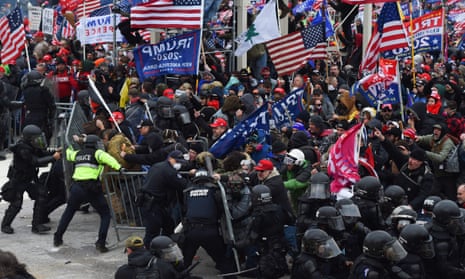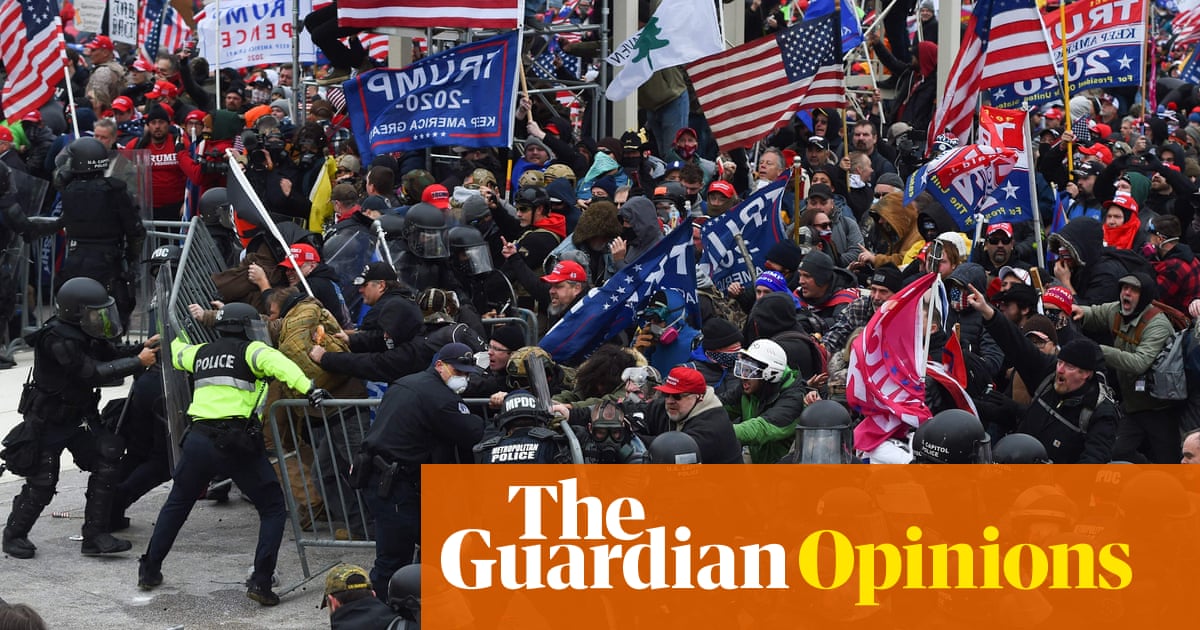
The Guardian view on Trump and political violence: more than words
Though extremist groups are under renewed pressure, the threat they pose has not disappeared
Like Joe Biden’s ascent to the White House, Donald Trump’s indictment for unlawfully holding classified documents and obstructing justice offers a partial answer to one great question of American politics: can the country’s institutions contain his excesses?
The backlash that the indictment has prompted highlights another: what happens when they do? When the Democrat defeated him, Mr Trump’s armed supporters stormed the Capitol to prevent the transfer of power, assaulting police officers and chanting “Hang Mike Pence”. Within minutes of his indictment last week, threats and even calls for civil war were surging on social media platforms used by his supporters.
The violent rhetoric doesn’t just come from the grassroots. The Arizona Republican Kari Lake announced that “to get to President Trump, you’re going to have to go through me, and you’re going to have to go through 75 million Americans just like me … Most of us are card-carrying members of the NRA [National Rifle Association].” Mr Trump himself previously warned of “death and destruction” if he were indicted in a separate case, over hush money payments.
His bluster at such times is intended to deter action against him – despite the extraordinary case put forward in the indictment, including the now-familiar photo of boxes stacked in a bathroom. It is critical to avoid hysteria or fatalism about the threats facing US democracy. It is true that the direst prognostications did not come to pass after the 2020 election.
Nonetheless, last year, research found that more than two in five Americans think a civil war is at least somewhat likely within the next decade. The number who think violence would be justified to restore Mr Trump to the White House has fallen since last year, but still stands at 12 million. An increasingly divided country is also increasingly well armed, with almost 400m privately held guns; their owners are disproportionately white, male and Republican. According to one study, almost 3% of adults, or 7.5 million people, bought a firearm for the first time between January 2019 and April 2021.
A slew of analysts have warned that the US could be heading towards widespread political violence. Prof Barbara Walter notes in her book How Civil Wars Start that two conditions are key: ethnic factionalism and anocracy – when a country is neither fully democratic nor fully autocratic. She believes that the US has the first, and remains close to the second, even if the short-term threat has ebbed somewhat since 2021. Others have pulled back from warnings of civil war, but think major civil disruption is entirely plausible.
No one foresees a straight confrontation between forces as in the 1860s, let alone a geographic split. What some experts fear is a guerrilla-style asymmetric conflict waged by a decentralised movement, with small groups or lone attackers targeting minority targets such as synagogues or gay clubs, civilians more broadly, infrastructure, or figures such as Democratic politicians, judges and election officials. Trumpism would be best understood not as the animating principle of such a conflict, but as a catalyst. People would not be fighting for Mr Trump so much as fighting because they believed he spoke for them. And if not him, another figurehead might yet emerge.
No violence broke out at the indictment hearing in Miami, as some had feared. Key figures on the extreme right are now locked up: more than 1,000 people have been charged with offences relating to January 6, and hundreds of those imprisoned. Others reportedly feel that Mr Trump has abandoned them. Nonetheless, the growth of threats and political violence in recent years is undeniable. That the language of Mr Trump and his enablers makes these more likely is surely, by now, beyond doubt.
-
Do you have an opinion on the issues raised in this article? If you would like to submit a response of up to 300 words by email to be considered for publication in our letters section, please click here.

